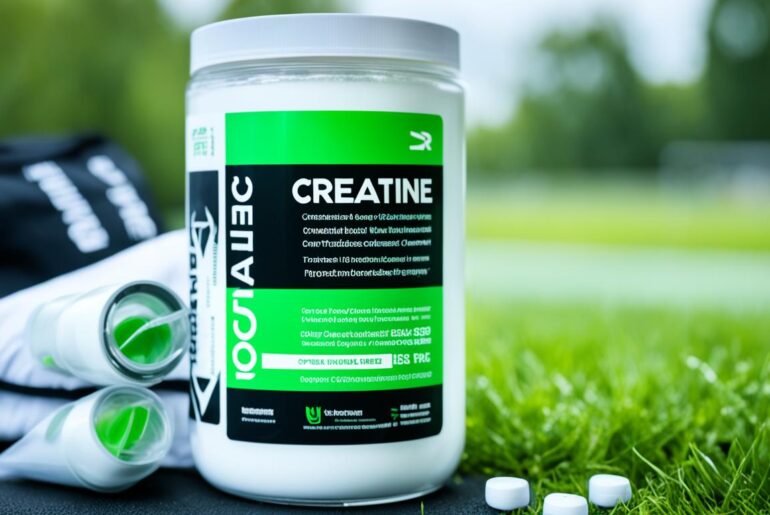In the realm of combat sports, a staggering 76% of athletes are said to use some form of dietary supplementation to optimize athletic performance. Among these supplements, creatine stands out, not only for its popularity but also for its significant role in helping athletes increase strength and power, as well as the potential to enhance endurance. As someone who takes their training and performance seriously, I’ve delved into the science and practicality of combat sports supplementation, particularly the multifaceted advantages of creatine supplementation.
Creatine has established itself as a cornerstone in the diet of athletes aiming to reach the peaks of human performance. For combat sport athletes, whose sports are defined by instantaneous bursts of high-powered movements and rapid recovery periods, the utility of creatine is exceptionally pertinent. However, as with any aspect of competitive athletics, incorporating creatine into one’s regimen is not a one-size-fits-all approach, particularly when considering the nuances of weight classes. Still, the benefits it offers in terms of combat sport performance enhancement are too substantial to ignore.
Key Takeaways
- Creatine is a key supplement for combat sport athletes looking to optimize athletic performance.
- Supplementation can significantly increase strength and power, which are vital for combat sports.
- Creatine may also help enhance endurance, offering a potential advantage during prolonged training or bouts.
- Due to creatine’s role in recovery, combat athletes may experience improved inter-set recovery times.
- Combat athletes must navigate the balance between performance gains and weight management when using creatine.
- With a targeted supplementation strategy, the advantages of creatine can be fully leveraged for combat sports.
Understanding Creatine and Its Benefits for Athletes
As someone intimately familiar with the intersection of nutrition and peak athletic performance, I’ve observed firsthand the profound impact that creatine supplementation can have on combat sport athletes. Known for its ability to bolster energy production, creatine plays an instrumental role in enhancing high-intensity, explosive movements—a staple of rigorous athletic training.
What Is Creatine?
Creatine is a naturally occurring compound in the human body, directly involved in the energy replenishment of muscles. In the realm of combat sports, where split-second decisions make the difference between victory and defeat, the benefits of creatine for combat sport athletes cannot be overstated. Its neuroprotective and cognitive enhancement properties extend beyond physical vigor, hinting at its all-encompassing advantages.
The Science of Creatine in Enhancing Athletic Performance
Scientific research consistently demonstrates creatine’s efficacy in augmenting muscle strength increases and muscle hypertrophy. The ability to repeatedly perform at high intensity without rapid fatigue is a testament to its significant role in achieving stamina in athletics. This energy-boosting supplement facilitates the rapid resynthesis of ATP, the energy currency of the cell, which is particularly drained during explosive sports actions.
Visible Benefits: Strength, Power, and Sprint Performance
- Muscle Strength: Creatine’s impact on muscle strength is evident, with notable improvements in max lifts and other strength metrics.
- Power Output: Increased power output manifests in faster punches and higher jumps, direct advantages in combat scenarios.
- Sprint Performance: The supplement’s benefits extend to sprint performance, critical during competition when closing in on an opponent.
Creatine isn’t just about raw physical prowess. It also significantly contributes to cognitive performance improvements, a lesser-known benefit that can give athletes the mental edge necessary for tactical maneuvers and sustained focus in the face of exhaustion or adversity.
| Performance Aspect | Benefit of Creatine |
|---|---|
| Muscle Strength | Enhances force production and overall strength |
| Muscle Power | Increases explosiveness, crucial for strikes and takedowns |
| Endurance | Supports sustained effort, delays fatigue onset |
| Cognitive Function | Improves alertness, strategic thinking, and decision-making |
In summary, the encompassing advantages of creatine are significant for those dedicated to excelling in the combative arena. With an empathetic understanding of the rigorous demands placed on combat sport athletes, I advocate for the inclusion of creatine in their nutritional armory, to harness the full spectrum of its ergogenic benefits.
The Role of Creatine in High-Intensity Combat Sports

As someone deeply immersed in combat sports, I’ve seen firsthand how creatine supplementation for combat sport athletes can be incredibly beneficial. Incorporating creatine into a training program helps athletes meet the rigorous demands of high-intensity performance, which are the cornerstone of disciplines like MMA, boxing, and wrestling. The attributes of creatine perfectly align with the need for repeated effort recovery and deliver combat sport-specific gains. Not to mention, there is substantial scientific evidence in sports performance literature supporting its use. Here’s why athletes are turning to creatine, and what studies have to say about its impact.
Aligning Creatine’s Properties with the Demands of Combat Sports
In the ring or on the mat, combat sports require a unique blend of strength, endurance, and rapid recovery. The phosphocreatine system, which is enhanced by creatine supplementation, provides quick and immediate energy during sudden high-intensity efforts. This aligns perfectly with the sporadic and explosive nature of combat sports. The potential of creatine to maximize performance in these conditions is inspiring, and I consider it an essential supplement for those looking to excel in these disciplines.
Why Combat Sport Athletes Turn to Creatine for Performance
Creatine’s popularity among athletes in the combat sports arena is no fluke. It’s known for improving power output – crucial in delivering forceful strikes and takedowns. Moreover, during back-to-back training sessions or fights, the enhanced recovery facilitated by creatine is invaluable. For those of us looking to mitigate fatigue and stay mentally alert, creatine’s benefits are incredibly relevant. Plus, the added potential to help protect against concussions is a promising aspect of creatine that cannot be overlooked in any sport marked by its physicality.
Scientific Studies on Creatine’s Impact in Combat Disciplines
Scientific research affirms what combat athletes and their trainers have observed – that creatine supplementation can contribute to an increase in punch strength, enhance the ability to sustain repeated high-intensity efforts, and shorten recovery time. One study revealed that boxers and martial artists experienced significant improvements in their power and recovery rates when supplementing with creatine. This scientific backing further cements creatine’s place as a pivotal addition to a combat athlete’s nutritional arsenal.
| Benefit | Description | Impact on Combat Sports |
|---|---|---|
| Increased Power Output | Augmented ability to perform explosive movements | More forceful strikes and effective takedowns |
| Enhanced Recovery | Reduced time between bouts needed for muscle recovery | Ability to sustain repeated high-intensity training sessions |
| Improved Endurance | Greater energy reserve for prolonged exertion | Sustained power and performance throughout matches |
Creatine for Combat Sport Athlete Performance: An In-Depth Look
My exploration into the influence of creatine for power and strength in combat sports brings to light how this potent supplement can be the catalyst for increasing combat sports performance. Through its ability to enhance quick muscle saturation with creatine, athletes witness a significant boost in muscle strength. This advantage is vital for the explosive movements and strenuous physical demands of sports such as wrestling, boxing, and mixed martial arts.
Contrary to the common skepticism regarding creatine’s role in water retention, my findings indicate that it is actually indicative of efficient uptake, potentially yielding more toned muscular aesthetics. The critical factor for combat athletes, through my perspective, is balancing the advantages of heightened performance against the temporary increase in weight—essential for those who must adhere to specific weight classifications.
Let’s break down the components of a comprehensive combat sports training regimen that incorporates creatine supplementation:
- Creatine loading to quickly raise muscle creatine levels
- Integration with high-intensity interval training for maximized athletic output
- Adaptation to pre-competition phases to manage potential impacts on weight
Here’s a closer look at how creatine intake can be structured to optimize performance:
| Phase | Loading Amount | Duration | Main Objective |
|---|---|---|---|
| Loading | 20g/day (divided into 4 servings) | 5-7 days | Rapid increase in muscle creatine stores |
| Maintenance | 5g/day | 3-4 weeks | Sustain elevated creatine levels |
| Pre-competition | None (or as advised) | 1 month before event | Normalize weight without losing performance |
By utilizing such a strategic approach, athletes in combat sports can fully harness the ergogenic properties of creatine while also maintaining their discipline’s weight requirements. With creatine integral to the quest for peak performance, it’s imperative for athletes to carefully calibrate intake in line with their training and competitive landscape.
Dosage and Administration: Optimizing Creatine Use
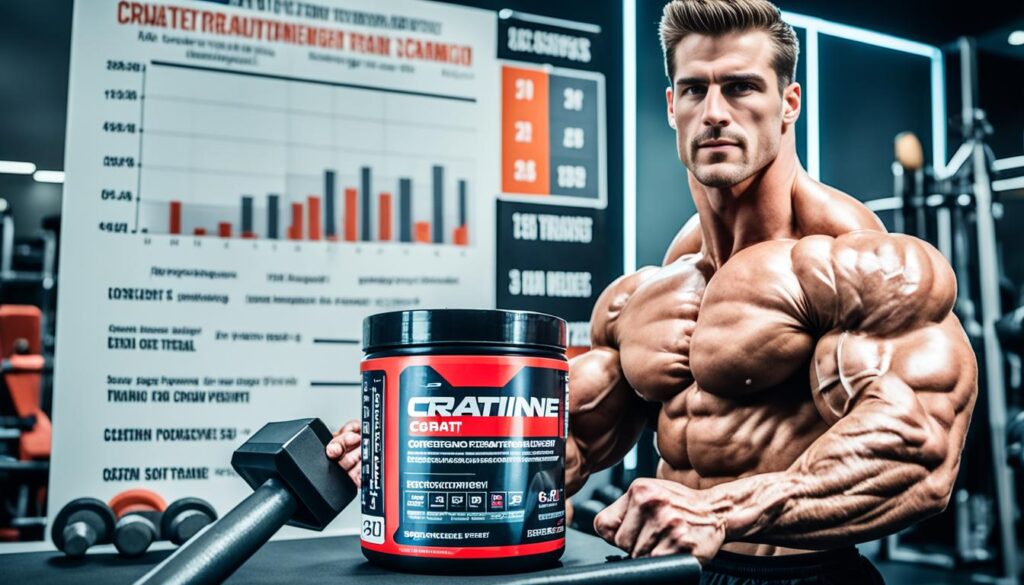
When it comes to enhancing athletic performance in combat sports, the detail is in the dosage and administration of creatine. For individuals curious about how to leverage this potent supplement, understanding the optimal creatine dosage for combat sports is paramount. Implementing a regimen of strategic creatine loading followed by careful maintenance upholds the delicate balance between achieving peak performance and maintaining desired body weight for weight-class based competitions.
The Importance of Correct Dosage for Maximum Benefit
Navigating the intricacies of maintenance of creatine supplementation often starts with a suggested standard dosage of 0.05g per kg of body weight daily. This foundation set in place, I then explore a loading phase, subtly increasing the daily intake to promote faster muscle creatine saturation—a key step for athletes endeavoring to tap into the increased strength and exertion creatine is known for.
Loading and Maintenance: A Strategic Approach
Starting with the loading phase, I advise a quadrupled dose for about seven days—a bold move aimed at kick-starting the muscle’s creatine reserves. This stage is critical for those preparing for intensive training cycles or looking to maximize strength in a shorter window. Post-loading, we return to the standard maintenance dosage, ensuring a steady and beneficial level of creatine within the muscles without the risk of unnecessary weight gain.
Best Practices: When and How to Take Creatine
Finding the right time to intake creatine might seem like searching for a window of magical opportunity. While the post-workout period can provide marginal benefits due to the body’s enhanced absorption capabilities, flexibility and personal schedule often dictate the most practical timing. Proper intake methods for creatine can also veer towards convenience—mixing it into a post-training shake or blending it with a meal, ensuring I adhere to the recommended dosages while also catering to my individual lifestyle and training needs.
| Phase | Dosage | Duration | Benefit |
|---|---|---|---|
| Loading | 0.3g per kg daily | 5-7 days | Rapid saturation of muscle creatine stores |
| Maintenance | 0.05g per kg daily | Ongoing | Sustain muscle creatine levels, optimize performance |
| Adjustment Period | Varies (Post-competition) | 3-4 weeks | Body weight normalization for weight-class athletes |
Attuned to the lifecycle of my supplementation, I carefully structure my intake around imperative competitions and training periods, becoming an architect of my own athletic destiny through the strategic power of creatine.
As a combat sport athlete, mastering the art of weight management is as crucial as perfecting a left hook. When it comes to optimizing athletic performance in combat sports, creatine is a staple—but it comes with its own set of considerations, particularly concerning weight classes. Here, I’ll delve into how athletes can manage weight classes with creatine, negotiate water retention realities, and leverage creatine use in competitive weigh-ins to their advantage.
Weight Management Considerations for Combat Athletes
Incorporating creatine into my training regimen required me to acknowledge its effects on body composition. From boxing rings to judo mats, athletes vying for advantage within strict weight limits must account for every variable. The increased muscle creatine not only boosts power but can influence my hydration levels and, subsequently, weight. Recognizing this, I had to strategize my creatine intake to ensure peak performance without jeopardizing my weight class.
Dispelling Myths: Understanding Creatine and Water Retention
Plenty of myths circulate regarding creatine and water retention, with many fearing undue bloating. In my experience, the truth is that proper creatine use bolsters intramuscular hydration—a positive for muscle function and aesthetics. The key lies in differentiating between harmful bloating and beneficial water uptake by the muscles, which can be essential for maintaining strength during exhaustive fights.
Making Weight: Strategies for Combat Athletes Using Creatine
The countdown to weigh-ins is a balancing act. While on creatine, I give myself a full month before competition to taper off and allow my body to equilibrate. This timing ensures that I benefit from creatine’s performance-enhancing effects during training while reverting to my baseline weight and water composition well in advance of stepping on the scales.
| Creatine Intake Phase | Objective | Duration | Considerations |
|---|---|---|---|
| Loading | Maximize muscle creatine stores | 5-7 days | Increased weight due to water retention; monitor body composition |
| Maintenance | Sustain creatine levels | 3-4 weeks | Manage weight class; adjust intake based on training demands |
| Tapering | Reduce creatine levels pre-weigh-in | Up to 4 weeks | Gradually decrease dosage; monitor weight and hydration |
In summary, creatine remains a game-changer in the sphere of combat sports for athletes like me seeking to boost their athletic prowess. By debunking misconceptions about water retention and tailoring creatine cycles, we can wield this powerful supplement to enhance our competitiveness without compromising our place in desired weight divisions.
Creatine’s Cognitive and Recovery Enhancements for Athletes

As a professional athlete in the combative arena, I’ve always considered my physical capabilities as paramount. However, I’ve learned over time that cognitive acuity is equally essential. The revelation of creatine for muscle recovery in combat sports has been a game-changer, but its cognitive benefits have proven to be just as vital for my success in and out of the ring. Delving into the scientific studies, I found that creatine isn’t just for physical prowess; it’s also about boosting intelligence and memory for athletes such as myself.
Boosting Brain Power: Creatine’s Cognitive Benefits
It’s fascinating to consider how creatine transcends pure physicality by bolstering the brain’s function. Research elucidates that the supplement can bolster cognitive processes, sharpening memory and enhancing problem-solving abilities, particularly under the stress of physical exertion. Apart from increasing memory retention, which is crucial during strategic fights, it also mitigates the mental fatigue athletes commonly experience. This positions creatine as not only a muscle amplifier but as an agent for accelerating recovery in sports on both physical and mental spectrums.
Enhancing Recovery: How Creatine Can Speed Up Muscle Repair
In combat sports, the toll taken on our bodies is immense; thus, expedited recovery isn’t just a luxury—it’s a necessity. The surge in creatine endorsement within sporting fraternities is largely attributed to its unparalleled muscle recovery properties. The compound has been instrumental in my own recuperation, helping to swiftly restore my muscular energy reserves post-training or competition. Studies substantiate its efficacy, indicating a rapid decrease in the markers of muscle damage when creatine is part of an athlete’s dietary regimen.
| Benefit | Impact on Combat Sports Athletes |
|---|---|
| Memory Enhancement | Improves strategic thinking and in-fight adaptability |
| Intelligence Boost | Heightens the ability to make quick decisions during matches |
| Recovery Speed | Minimizes downtime between training sessions and competitions |
| Muscular Repair | Facilitates muscle tissue repair and growth after intense exercise |
While reaping the benefits of creatine on the mat, I’ve also noticed improvements off of it, particularly in areas requiring mental sharpness. For any athlete in the combat sports domain concerned with both intellect and muscle recovery, creatine appears to be the comprehensive supplement of choice. As someone who embodies the life of an athlete devoted to both physical battles and the pursuit of mental excellence, the cognitive benefits of creatine have made a discernible difference to my overall performance.
Creatine Monohydrate Versus Other Forms
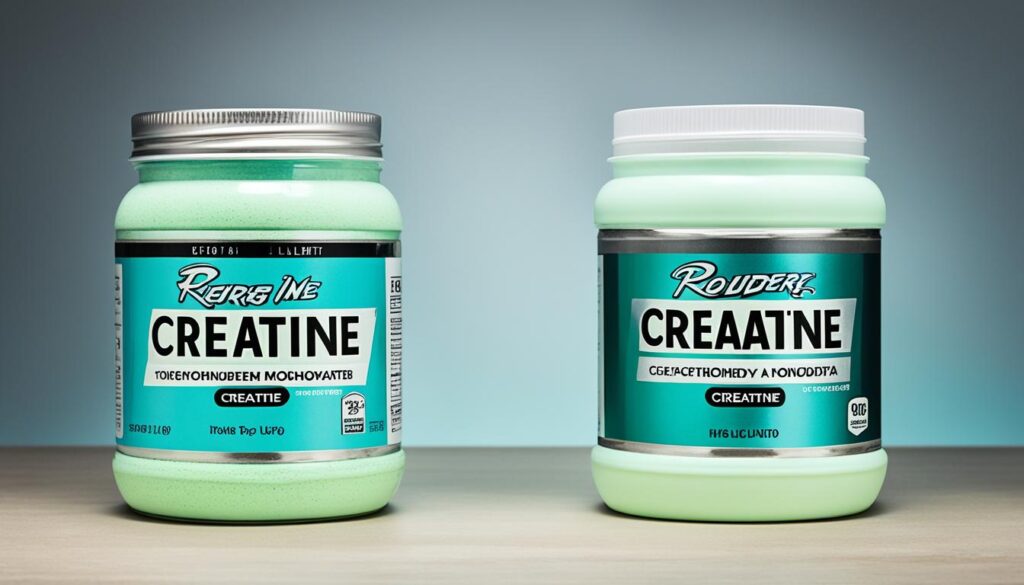
When I delve into combat sports nutrition, the debate often turns to the efficacy of different creatine forms. With an array of options at my disposal, I consistently return to creatine monohydrate for its unmatched track record in scientific research and practical application within the athletic community. Let’s explore why selecting the right creatine matters for the best performance outcomes.
Why Creatine Monohydrate Is the Preferred Choice
In the realm of supplementation, creatine monohydrate is widely acknowledged as the go-to option for athletes. As a combat sport enthusiast, I rely on this form not only for its proven effectiveness but also for its affordability, making it an essential component of my training regime.
Comparing Efficacy: Monohydrate Against Other Creatine Variants
Understanding the varying efficacy of different creatine forms is key to maximizing my regime’s benefits. Let’s look at how creatine monohydrate stands up against its counterparts.
| Creatine Form | Research-Backed Efficacy | Cost Consideration | Recommended for Combat Sports |
|---|---|---|---|
| Creatine Monohydrate | Extensive | Most Affordable | Yes |
| Creatine Ethyl Ester | Limited | Higher | No |
| Creatine Hydrochloride (HCl) | Moderate | Higher | Possibly |
| Buffered Creatine | Moderate | Higher | No |
| Liquid Creatine | Questionable | Highest | No |
As displayed, creatine monohydrate not only excels in evidence-based performance but also in economic viability, confirming my choice for supplementation.
Addressing the Myths: Safety and Side Effects of Creatine

As I delve deeper into the world of sports supplements, the safety of creatine supplementation becomes a pivotal topic of discussion. Amid widespread use, misconceptions about potential creatine side effects persist, casting doubts in the minds of skeptics and concerned athletes alike. It’s time to address these myths about creatine and provide evidence-based insights to quell undue apprehensions. Below, I’ll navigate through common misgivings and then present data that clearly debunk the prevalent creatine myths.
The Truth About Creatine and Kidney Health
One of the most enduring myths plaguing creatine is its alleged negative impact on kidney health. Concerns circle around the misconception that creatine supplementation may tax the kidneys, leading to adverse effects. However, numerous studies definitively illustrate that for individuals with healthy kidneys, creatine’s safety profile is robust, negating the need for undue concern over kidney function.
Debunking Common Misconceptions Surrounding Creatine Use
Let’s dissect and discard several other unfounded fears associated with creatine usage. The following table lays bare the facts, separating myth from reality and providing a clearer understanding of creatine’s authentic side-effect landscape.
| Common Myth | Reality | Explanation |
|---|---|---|
| Creatine causes dehydration and cramping | No evidence supports this | Research shows no increased risk of dehydration or cramping with creatine; hydration is key. |
| Creatine leads to digestive problems | Rare and dependent on individual sensitivity | Some may experience this if sensitive or with high doses; most tolerate it well. |
| Creatine supplementation causes baldness | No direct causal link established | This is based on one study’s hypothesis about a potential link to DHT; more research needed. |
| Creatine is a steroid and can be banned | Creatine is not a steroid and is legal in sports | Creatine is a natural compound and is not listed as a prohibited substance in sports. |
In summarizing, it remains clear that the safety of creatine supplementation is well-documented, with side effects generally being minor or nonexistent for the majority of users. As a long-standing advocate within the sports nutrition space, I can affirm that responsible use of creatine aligns with both health and performance aspirations.
Personalizing Creatine Supplementation: Responders vs. Non-Responders
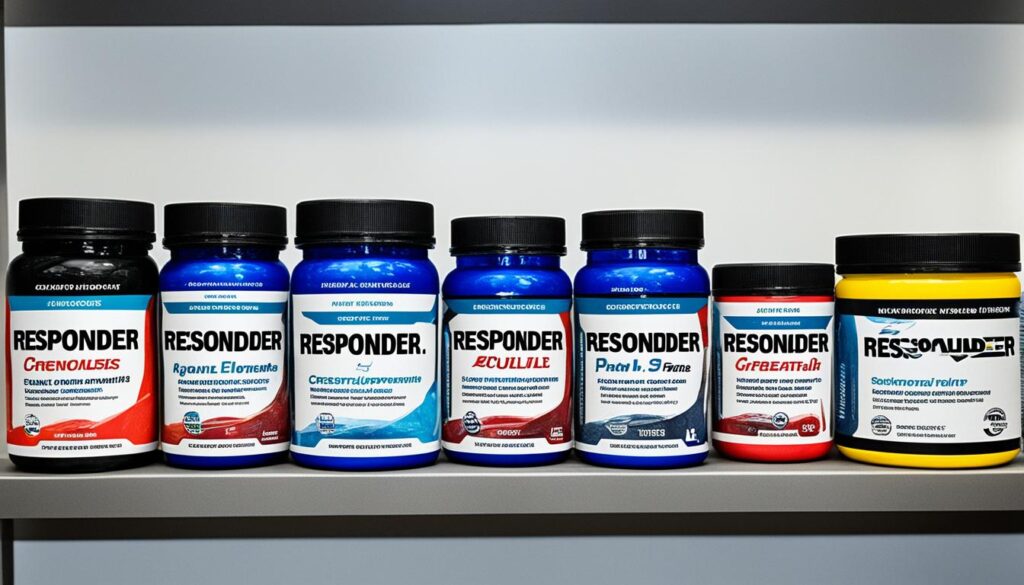
As someone deeply invested in the optimization of combat sport athletes’ energy levels, I’ve come to appreciate the variability in individual supplement responses. Understanding whether you’re a responder or a non-responder to creatine can be critical in developing personalized creatine plans that support your athletic pursuits.
Identifying Your Individual Response to Creatine
Embarking on a creatine regimen starts with observation. How does my body react to creatine supplementation? Do I experience noticeable improvements in strength and recovery? As I track changes in my performance, it becomes evident that personalized strategies are paramount. Not all athletes will experience the transformative energy boost often attributed to creatine—therein lies the distinction between responders and non-responders to creatine.
Adapting Supplementation to Your Personal Physiology
Once I discern my response to creatine, I can tailor my supplementation strategy. For some, the journey might begin with a standard creatine protocol, but it could evolve into a nuanced regimen that aligns with my training cycles and dietary habits. Could a higher or lower dose elicit a better response? Is my intake timing optimal for peak performance? These are the questions that guide personalized supplementation.
| Characteristic | Responder | Non-Responder |
|---|---|---|
| Muscle Fiber Type | Higher proportion of Type II fibers | Higher proportion of Type I fibers |
| Dietary Habits | Lower dietary creatine | Higher dietary creatine |
| Initial Creatine Levels | Lower baseline levels | Higher baseline levels |
| Supplementation Effects | Increased power and recovery | Minimal noticeable change |
If I find that I’m a non-responder, I could explore other aspects that contribute to my overall wellbeing and performance, such as hydration, sleep quality, and effective training programs. For those who do respond, maintaining a precise schedule and dosage could maximize the ergogenic benefits of creatine, making the difference in a highly competitive combat sport environment.
Expert Opinions: What Coaches and Nutritionists Are Saying
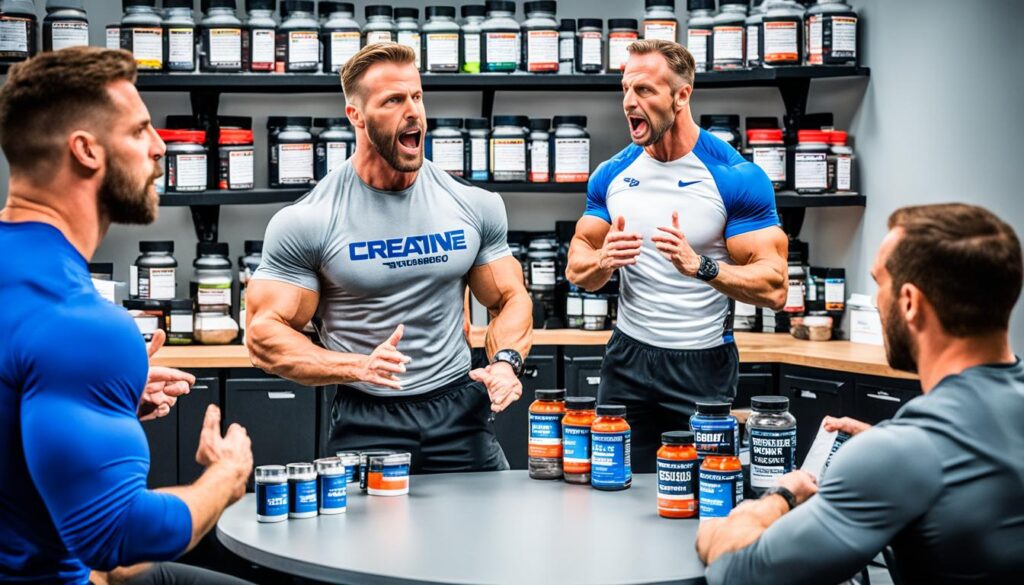
Throughout the intricate world of combat sports, the efficacy of creatine as a combat sport performance enhancer is widely recognized by those at the forefront of athlete development. Gleaning insights from an assemblage of expert opinions on creatine, one finds a resounding endorsement of its role in elevating athletic prowess.
Trusted Voices: Testimonials from the Combat Sport Community
Coaches, instrumental in sculpting the pinnacle of athletic achievement, often express how supplementation with creatine has bolstered their athletes’ performance metrics. From these testimonials, increased power generation and swifter recovery periods stand out as recurrent themes. Coaches’ perspectives on creatine, seasoned by years of in-ring experience, solidify the supplement’s status as a venerable aid in the competitive arsenal.
Professional Recommendations: Insights from Sports Nutrition Experts
While coaches focus on the strategic employment of creatine, nutritionists’ advice on supplementation sheds light on the optimal incorporation into an athlete’s dietary matrix. Nutrition experts extol the virtue of creatine, not merely for its physical benefits but also for its contribution to cognitive resilience—an equally critical aspect in the demanding arena of combat sports.
Consider the perspectives gathered in the following table, which distills the collective wisdom of coaches and nutritionists into actionable advisements:
| Professional | Insight | Application |
|---|---|---|
| Combat Coaches | Enhances training intensity and fight preparedness | Implement during strength and conditioning cycles |
| Sports Nutritionists | Boosts recovery and muscle adaption | Advocate post-workout supplementation protocols |
| Cognitive Specialists | Improves cognitive function and stress response | Include as part of a broader nutritional strategy |
| Weight Class Advisors | Manages water retention for optimal weigh-in results | Adjust timing pre-competition for weight-sensitive athletes |
My takeaways from these collective insights emphasize that creatine is far more than a mere muscle compound—it’s a multi-faceted performance asset. By synthesizing both the coaches’ and nutritionists’ profound understandings into my regimen, I can strategically leverage creatine’s benefits to transcend previous athletic boundaries.
Conclusion
As we reflect on the compelling impact of creatine on combat sports performance, it’s evident that its benefits are far-reaching. For athletes engaged in the rigor of combat sports, creatine offers a significant boost in areas indisputably critical to their success—strength, power, endurance, cognitive function, and recovery. My personal journey and scrutiny into the supplementation of creatine have convinced me of its indispensable value in optimizing athletic output.
Summarizing the Role of Creatine in Combat Sports Performance
Throughout this exploration, the evidence supporting creatine for combat sport athletes has been clear and consistent. The versatility of creatine to not only enhance physical attributes but also to fortify mental sharpness is remarkable. My analysis underscores that adopting creatine supplementation could very well be a game-changer for combat sports enthusiasts looking to elevate their game.
Making the Decision: Should You Add Creatine to Your Regimen?
The decision to incorporate creatine into my supplementation routine was made after thorough consideration of my training goals, weight class requirements, and my body’s response to this nutrient. For any athlete pondering over the creatine supplementation decision, I suggest a similar approach—evaluate your individual needs, consult with a healthcare professional if necessary, and let research be the guiding light, not hearsay or unfounded concerns.
Future Perspectives: Creatine Research and Emerging Trends
Looking forward, creatine research continues to gain momentum, promising to unveil even more about its potent role in sports nutrition. Staying informed on creatine trends in sports nutrition will be pivotal for athletes like myself, who are always eager to harness the forefront of scientific advancement for peak performance. I anticipate that future studies will provide deeper insights into optimizing creatine’s effects, broadening the horizon for combat sports athletes and sports enthusiasts alike.
FAQ
What Is Creatine?
Creatine is a natural substance found in muscle cells that helps your muscles produce energy during high-intensity exercise or heavy lifting.
The Science of Creatine in Enhancing Athletic Performance
Creatine supplementation has been shown to increase muscle creatine stores, which in turn can improve performance in activities requiring short bursts of high intensity such as combat sports.
Visible Benefits: Strength, Power, and Sprint Performance
Athletes supplementing with creatine often experience increases in muscle strength, explosive power, and improved performance in high-intensity, repetitive activities like sprinting.
Aligning Creatine’s Properties with the Demands of Combat Sports
The properties of creatine, such as its ability to quickly replenish energy stores, make it ideal for the high-intensity, rapid recovery nature of combat sports.
Why Combat Sport Athletes Turn to Creatine for Performance
Combat sport athletes use creatine to enhance their power output, recovery between intense exercise bouts, and overall athletic performance.
Scientific Studies on Creatine’s Impact in Combat Disciplines
Numerous studies have confirmed the efficacy of creatine in improving key performance metrics such as punch strength, power maintenance, and recovery rates in combat disciplines.
The Importance of Correct Dosage for Maximum Benefit
To maximize the performance benefits of creatine, it is important to take the correct dosage. Standard recommendations often start at 0.05g per kg of body weight daily.
Loading and Maintenance: A Strategic Approach
A loading phase with a higher dose of creatine is often used to quickly saturate the muscles, followed by a maintenance phase with a lower dose to sustain the creatine levels.
Best Practices: When and How to Take Creatine
Though timing is somewhat flexible, many athletes find post-exercise creatine supplementation to be beneficial. The key is consistent use with proper dosage over time.
Weight Management Considerations for Combat Athletes
Combat athletes in weight-sensitive sports should carefully manage creatine supplementation, potentially cycling off before weigh-ins to allow for any water weight gain to subside.
Dispelling Myths: Understanding Creatine and Water Retention
The water retention from creatine should not be mistaken for bloating; it is actually a sign of successful creatine uptake, contributing to muscle function and potentially aesthetics.
Making Weight: Strategies for Combat Athletes Using Creatine
Athletes may choose to stop creatine supplementation around a month prior to competition to ensure any additional water weight is lost and baseline muscle creatine levels are reached.
Boosting Brain Power: Creatine’s Cognitive Benefits
Creatine supplementation can improve cognitive function, with studies showing benefits in tasks requiring memory and intelligence as well as resilience to sleep deprivation.
Enhancing Recovery: How Creatine Can Speed Up Muscle Repair
Creatine can accelerate the muscle recovery process following high-intensity exercise, helping athletes to train more effectively and reduce downtime between training sessions.
Why Creatine Monohydrate Is the Preferred Choice
Creatine monohydrate is the most researched form of creatine and is regarded for its proven effectiveness and cost-efficiency compared to other variants.
Comparing Efficacy: Monohydrate Against Other Creatine Variants
Creatine monohydrate remains the gold standard among creatine supplements due to its extensive research backing and relative effectiveness over other forms.
The Truth About Creatine and Kidney Health
Scientific research has generally shown that creatine supplementation does not cause harm to the kidneys in healthy individuals who consume it responsibly.
Debunking Common Misconceptions Surrounding Creatine Use
Myths about the safety of creatine, such as kidney damage or severe side effects, are largely unfounded according to the majority of scientific studies.
Identifying Your Individual Response to Creatine
Responses to creatine supplementation can vary, and it’s important for each athlete to monitor their performance and recovery to determine their individual reaction.
Adapting Supplementation to Your Personal Physiology
Once an athlete knows how their body responds to creatine, they can tailor their supplementation strategy to optimize the benefits for their particular physiology and combat sport discipline.
Trusted Voices: Testimonials from the Combat Sport Community
Coaches and nutritionists in the combat sports community have spoken positively about the performance-enhancing effects of creatine when used properly.
Professional Recommendations: Insights from Sports Nutrition Experts
Sports nutrition experts often recommend creatine as an effective supplement for combat sport athletes, advocating for its strategic use alongside a balanced diet and training plan.




